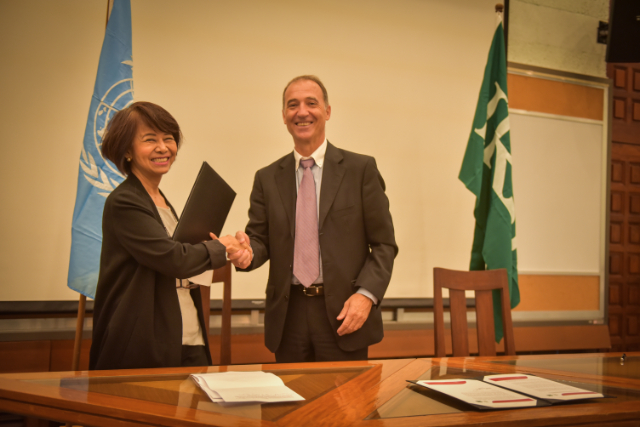The International Rice Research Institute (IRRI) has joined the UN Global Compact (UNGC), the world’s biggest corporate sustainability consortium, in a decisive move to address climate change as well as food security.

Photo from IRRI
IRRI leads the world in the research, preservation, and improvement of rice varieties. To date, some 12% of IRRI’s energy demands are met by solar energy. But the Institute is eager to grow this reliance in the coming years while also exploring other green solutions to further reduce its carbon impact.
Moreover, IRRI Director-General Dr. Jean Balié emphasized the need for corporate responsibility in responding to climate change when he spoke at the formal signing ceremony at the IRRI Headquarters in Los Baños, Laguna, last September 13.
“We cannot have a business as usual approach… We need to act now,” he stressed. “We must be part of the solution. As we advocate for sustainability in our research, our Institute is also prepared to practice what we preach and lead by example.”
Balié also looks forward to the UNGC’s assistance in helping mitigate the high energy costs of IRRI’s International Rice Genebank. With over 132,000 sample sets from each of the 132 rice-producing nations — including cultivated species of contemporary rice and traditional variations, as well as wild species — the Genebank is the biggest repository of its kind in the world.

Photo from IRRI
“The UNGC can be a platform for corporate citizens to move forward in sustainability and learn from each other as we navigate essential challenges of methodologies, best practices, and innovative solutions,” Balié explained. “For IRRI, our participation is a key step in the Institute’s mission and our shared goals vis-à-vis our stakeholders.”
The UNGC strives to promote ecologically-sound business practices among its 15,000 members in 164 countries worldwide. The organization was represented at the signing ceremony by Ma. Luz Javier, vice chair of the GCN Philippines, its local counterpart. Javier emphasized the value of public-private cooperation for nation-building as she welcomed IRRI’s inclusion in the UNGC.
“The business and private sectors, including research institutions, are the strong engines for nation building and global trade. These sectors are the main partners of governments to build economies, bring jobs, create opportunities for countries to thrive, and continuously develop,” she said.




